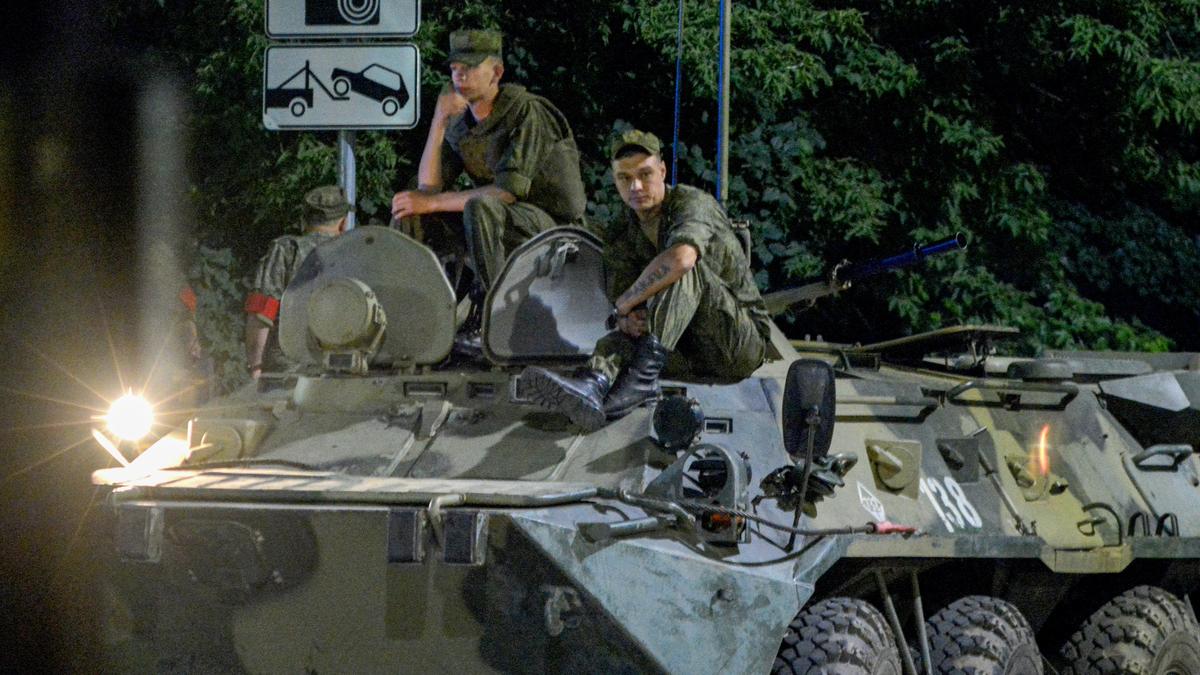Why was the column of rebels not stopped during its advance on Moscow? What forces was Yevgeny Prigozhin really in charge of? What will happen to the Wagner chief next? Novaya-Europe talked to military experts to try and make sense of a rebellion that petered out in a day.
Honorary surrender
“It’s a pity that people do not study the history of military coups,” Israeli military expert David Sharp tells Novaya-Europe. “Otherwise, they’d know that the two opposing sides could quite well come to an agreement during a coup. This has happened quite often in African countries. Although, usually there’s more blood spilled than during Prigozhin’s rebellion. When one of the conflict sides realises the futility of further action, the negotiations begin. In this case, I am certain, we are dealing with an honorary surrender.
It seems that Prigozhin had serious goals at first. However, in the several hours the “march for justice” was occurring, the Wagner chief must have realised that he would not be able to reach the objectives he had set out.
For example, the regular army units did not rush to join the mercenaries. And in Moscow, obviously, they would have had to engage in urban warfare, which could lead to the death of Prigozhin himself.”
According to David Sharp, one has to pay attention to the fact that Prigozhin was seen as an equal and a strong opponent in the negotiations. In the end, he was not officially declared a traitor, insurgent, or rebel that needed to be arrested immediately.
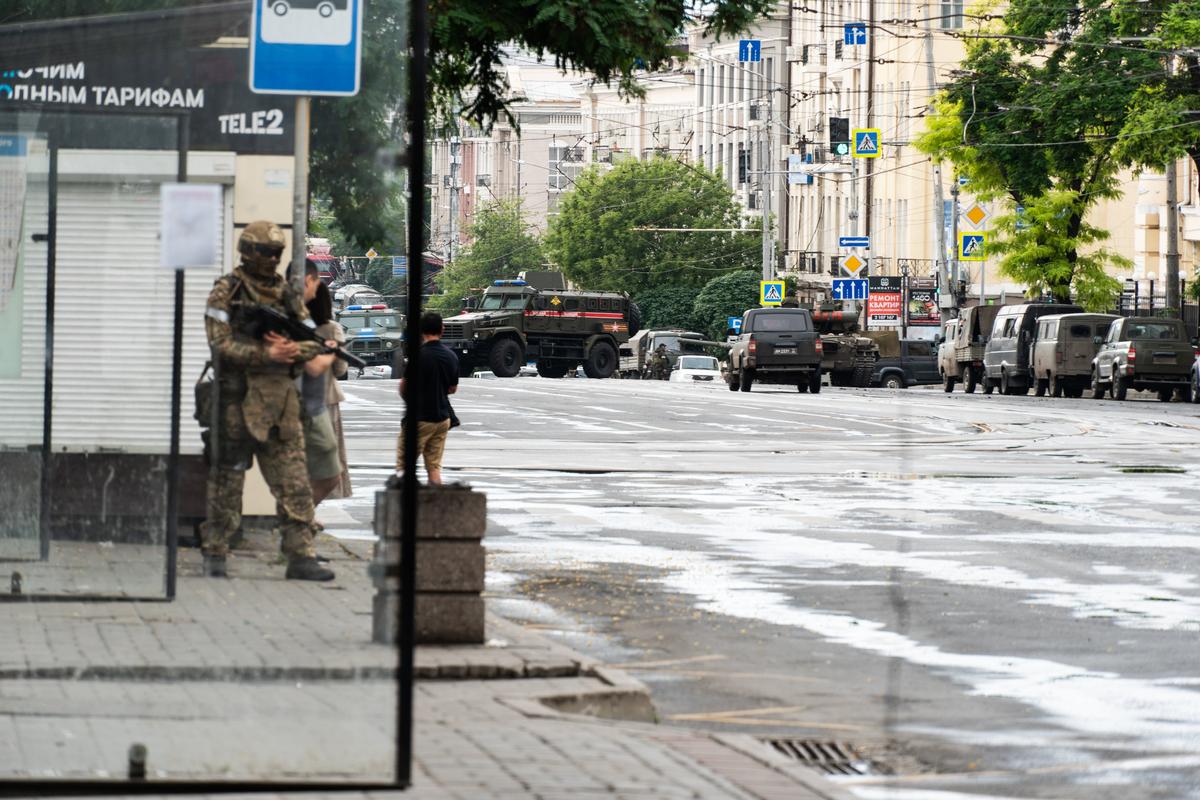
PMC Wagner mercenaries in Rostov-on-Don, 24 June 2023. Photo: Novaya Gazeta Europe
The Russian authorities, it seems, also decided not to escalate the situation and back Prigozhin into a corner. Alyaksandar Lukashenka was brought in for the negotiations as a convenient figure — a puppet leader who doubles in a bit of self-sufficiency. Moreover, he agreed to welcome the Wagner chief for his exile in Belarus.
“We are seeing an obvious failure of Russian special services,” says David Sharp. “Even the US, according to the media that cite sources within the US intelligence, had information about the upcoming rebellion. It’s likely that Americans have data from wiretapping and information control over other types of communication used by Russian servicemen and mercenaries. One of the reasons why this information wasn’t made public is that
Washington did not want to be accused of participating in the preparations for the rebellion. Meanwhile, Russia’s Federal Security Service, Federal Guard Service, other special services, and police missed this threat entirely.
Speaking simply, this is a disgrace. Even after the start of an open conflict, the government didn’t try to actually put a stop to the advance of the columns, only sending helicopters out to capture them.”
David Sharp believes that the government couldn’t prevent the capture of Rostov-on-Don by the mercenaries due to a simple lack of resources. Furthermore, the element of surprise played a role: the enemy that had appeared out of nowhere began advancing from the deep rear of Russia. Six helicopters and a plane belonging to Russian forces were shot down — this is the number quoted by Russian Telegram channel Fighterbomber and other outlets. This number is seriously damaging for Russia’s Armed Forces.
When it comes to victims, the data differs from 13 to 20 killed crewmembers of downed military aircraft. These losses are a consequence of misuse of aviation. The military staff did not account for the mercenaries having a Pantsir missile system.
Still, had the situation got worse for the official government, it could have used attack aircraft and bombers. Then there wouldn’t have been much left of the column.
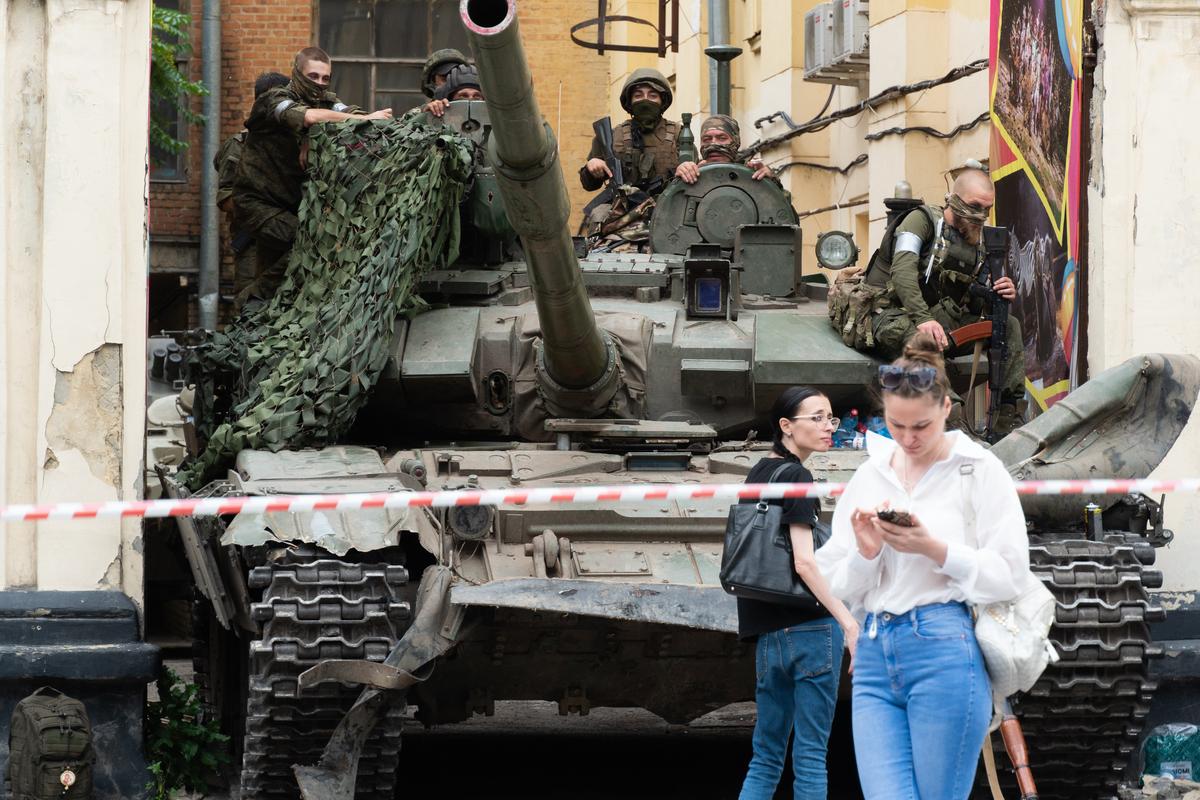
PMC Wagner mercenaries in Rostov-on-Don, 24 June 2023. Photo: Novaya Gazeta Europe
David Sharp claims that there’s video evidence of only one Ka-52 helicopter destroyed by Wagner fighters. It has been reported that the crew was killed. Furthermore, there’s information about a shot-down Mi-35 military helicopter and four Mi-8 helicopters, three of which were used for electronic warfare. Also, a flying command centre was downed — an Il-22 plane, with up to eight people, including pilots and the crew, possibly on board.
The moment of a helicopter missile hitting the moving Wagner column was also captured on video. But the data on Wagner losses has not been made public.
Although Prigozhin said he had 25,000 fighters at his disposal, David Sharp has doubts in regards to how true that was. It’s possible that the number is how many active PMC mercenaries there are at all at the moment. The videos did not show multi-thousand columns advancing on Moscow. It would take hundreds of trucks to transport thousands of fighters, as well as ammunition and supplies, and there has been no evidence of that.
“It’s possible we haven’t seen all the columns, although they couldn’t have just disappeared,” adds David Sharp. “Even after the end of the rebellion, the hardware should’ve been transported back to the dislocation points.”
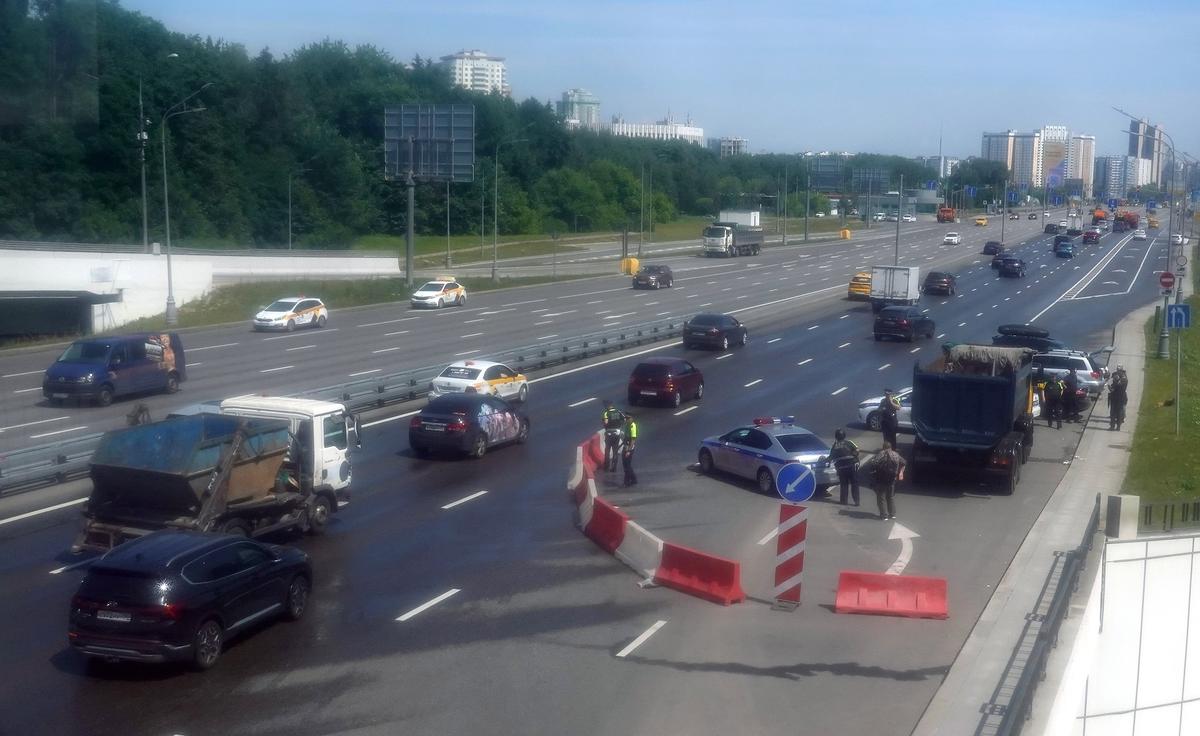
Police officers on duty at a checkpoint on the way to the Moscow region from Moscow, 25 June 2023. Photo: EPA-EFE/MAXIM SHIPENKOV
It’s obvious that the government won’t stop trying to liquidate all the detachments that it’s not in control of. The order on volunteer detachments having to sign contracts with the Defence Ministry demands all of them do it before 1 July.
According to David Sharp, a structure like PMC Wagner clearly has to be shut down; any mention of the organisation’s name should be banned. A part of personnel will sign contracts with the army, another part can leave for Africa or for Belarus with their leader. Some of the mercenaries could demobilise, as has already happened with a big number of former convicts. Prigozhin himself, quite likely, will appear in public less often.
Prigozhin overplayed his hand
“It’s obvious to me that Prigozhin did not plan to overthrow Putin, at the most, he wanted to get rid of [Russia’s Defence Minister] Sergey Shoigu and [Chief of the General Staff] Valery Gerasimov,” former Israeli police and intelligence officer Sergey Migdal tells Novaya-Europe. “But Putin doesn’t get rid of even the least effective officials and commanders. Prigozhin, above all else, is a criminal and businessman. He felt cornered. It was clear that Shoigu and Gerasimov decided to finish him off, and possibly imprison him, or even kill him, and also dissolve PMC Wagner. And Prigozhin decided to flip the chessboard. But he overplayed his hand. One has to take into account the fact that Wagner doesn’t have its own supplies and it depends entirely on the Defence Ministry for ammunition. The whole march looked like a gamble.”
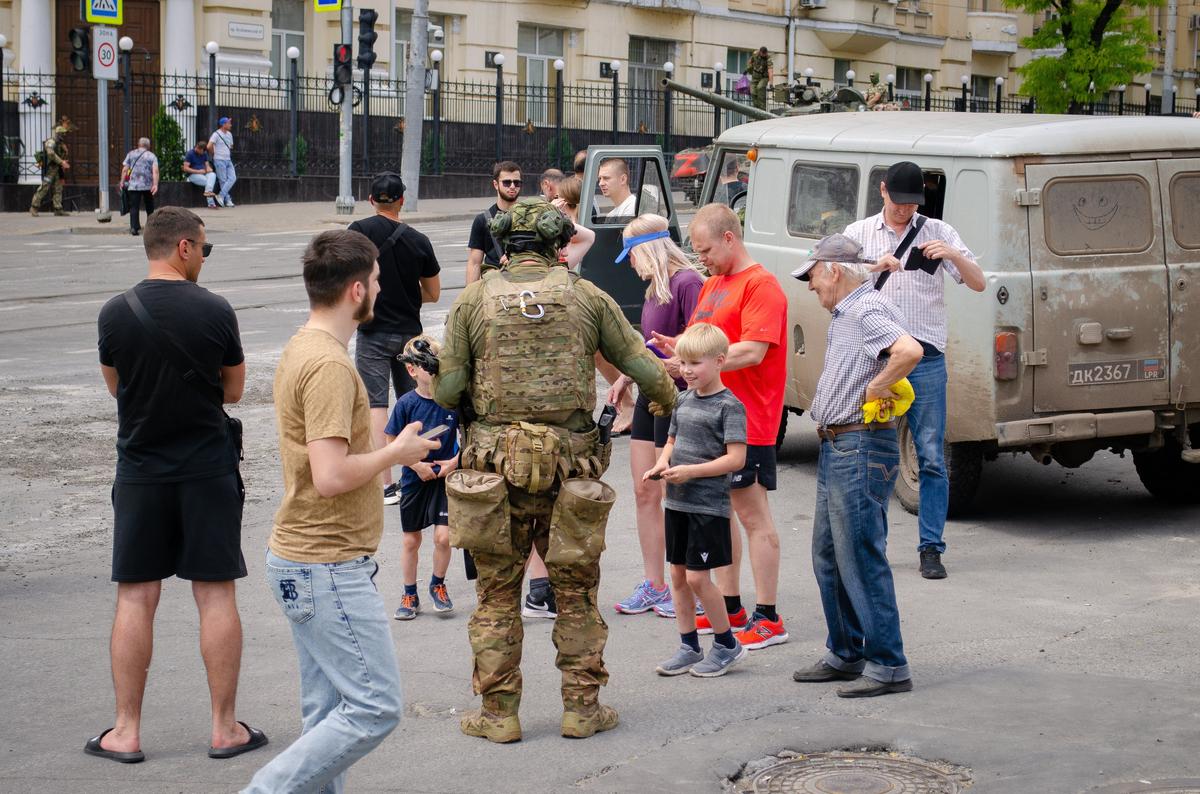
PMC Wagner fighters in Rostov-on-Don, 24 June 2023. Photo: Novaya Gazeta Europe
Sergey Migdal says that almost all of Russian military units are currently at the front, however there are thousands of security officers stationed in Moscow: the National Guard’s elite forces, the special forces centre of the Federal Security Service, the Federal Guard Service forces. Planes full of paratroopers and other forces were flying to Moscow from all over the country. But there was simply no one who’d be able to stop the Wagner columns on the way.
“I understand the motivation of Prigozhin and his fighters,” explains Sergey Migdal.
“They wanted to either keep the status quo of their PMC and receive some privileges for themselves.
But why an average police officer or a conscript would try to stop a professional mercenary is unclear. The only option is an order from some fat lieutenant colonel with a service gun. But in that case, it’s easier to come up with an excuse on why they didn’t manage [to stop them]: ran out of gas, the car broke down, did not understand the order. Russian security officers had zero desire to fight Wagner mercenaries. Do not forget that state propaganda spent many months talking up PMC Wagner as the most courageous and undefeatable defenders of the Homeland.”
The person who sent an Il-22 to the area where the column was advancing did not know that the mercenaries had a Pantsir system, Sergey Migdal believes. A plane of this kind cannot dodge an anti-aircraft missile. Prigozhin himself explained that the fighter responsible for air defence had been firing at all the objects flying nearby. In the end, the higher military command that had sent the planes there is responsible for the pilots’ deaths. Furthermore, the blame must also be laid on Putin personally — he was the one to give orders to supply the PMC with military hardware and anti-aircraft missile and gun systems.
“We don’t know what fate awaits Prigozhin now,” continues Sergey Migdal.
“It’s known that Putin does not forgive treason and betrayal from his associates. Especially after a humiliation like the Moscow march was.
It’s possible that the Wagner chief decided to quit the game while the stakes were high. One could speculate that he plans to leave for Africa and be based there with his personal battalion of trusted guards and a harem of local beauties. That would be a beautiful exile. Whether he’ll be allowed to do that — we will see. One could also make a case for Prigozhin being eliminated as soon as the opportunity presents itself.”
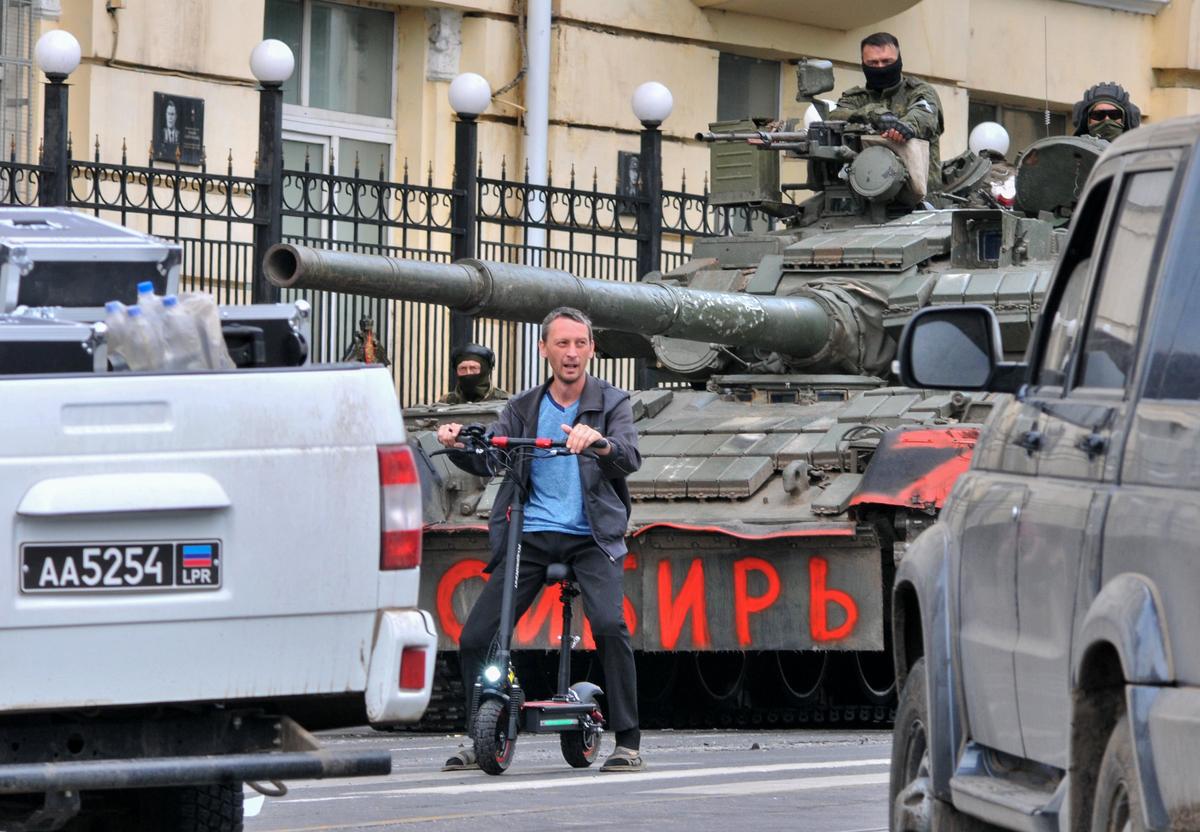
The centre of Rostov-on-Don, 24 June 2023. Photo: EPA-EFE/ARKADY BUDNITSKY
Something went wrong
Roman Svitan, a reserve lieutenant of Ukraine’s Armed Forces and a flight instructor, says that the rebellion attempt was staged.
“I think the main goal was to make the Collective Security Treaty Organisation countries [Armenia, Belarus, Kazakhstan, Kyrgyzstan, and Tajikistan] enter the conflict,” says the Ukrainian military expert. “Everything should’ve gone just like it did in Kazakhstan. I think the main task was to get the military hardware involved, that the countries that are members of the security treaty have at their disposal. Today, these countries have a lot of weapons that Russia desperately needs. But [Kazakhstan’s President] Kassym-Jomart Tokayev did not listen to Putin and said that this was Russia’s internal affair. Afterwards, they had to swiftly fold the entire operation.”
Roman Svitan is certain that the anti-aircraft gunners who shot down the Russian army’s helicopters and plane just weren’t aware about the higher-up’s agreements and were firing at everything flying over them. It’s not hard for a professional soldier to destroy such a vulnerable target as a helicopter. This factor just wasn’t taken into account.
“Now, pilots will be eliminating mercenaries at every opportunity,” says the Ukrainian pilot. “If they will be fighting at the front, there’s a high chance of friendly fire.”
Join us in rebuilding Novaya Gazeta Europe
The Russian government has banned independent media. We were forced to leave our country in order to keep doing our job, telling our readers about what is going on Russia, Ukraine and Europe.
We will continue fighting against warfare and dictatorship. We believe that freedom of speech is the most efficient antidote against tyranny. Support us financially to help us fight for peace and freedom.
By clicking the Support button, you agree to the processing of your personal data.
To cancel a regular donation, please write to [email protected]
